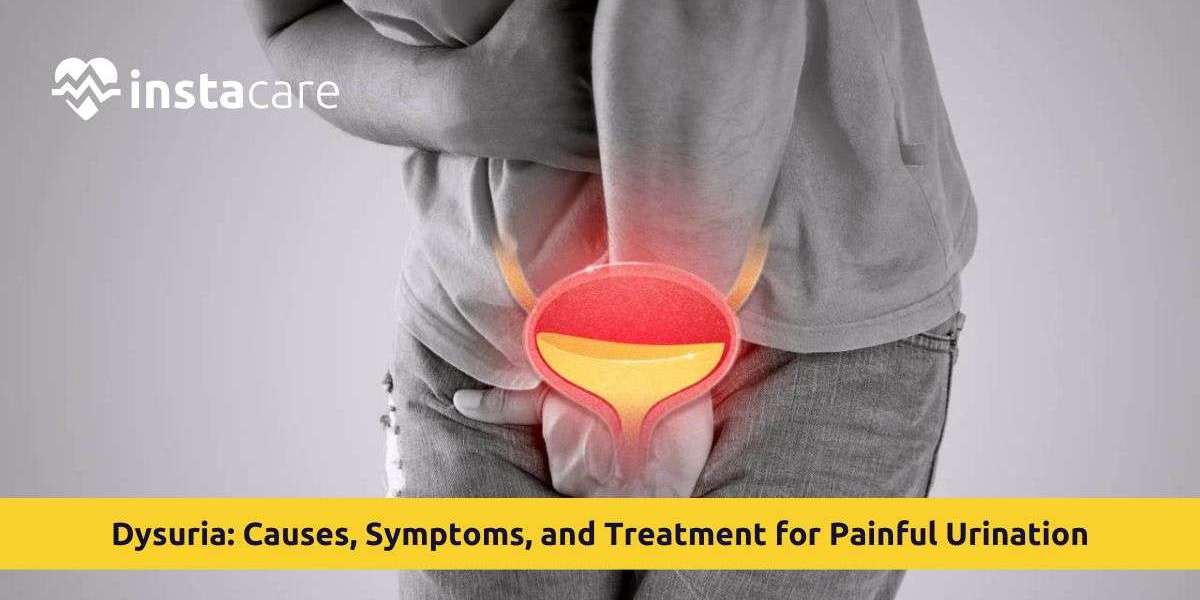Dysuria refers to pain, discomfort, or a burning sensation while urinating. It is not a disease itself, but rather a symptom of an underlying condition affecting the urinary tract. Painful urination can be temporary or persistent and may affect people of all ages. It is more common in women due to their shorter urethra, but men can also experience dysuria, often for different reasons.
Because dysuria can sometimes signal a serious infection or medical issue, identifying the cause, associated symptoms, and proper treatment is essential.
What is Dysuria?
The term dysuria simply means pain during urination. This pain can:
- Occur at the start, during, or at the end of urination
- Be described as burning, stinging, or sharp pain
- Be accompanied by other urinary symptoms like frequent urination or urgency
Dysuria usually indicates inflammation or irritation of the bladder, urethra, or surrounding tissues.
Causes of Dysuria
There are multiple causes of painful urination, ranging from infections to structural and inflammatory conditions.
1. Urinary Tract Infections (UTIs)
- Most common cause in women
- Bacteria (often E. coli) infect the urethra and bladder
- Symptoms: burning during urination, frequent urination, cloudy or foul-smelling urine, sometimes blood in urine
2. Sexually Transmitted Infections (STIs)
- Chlamydia, gonorrhea, trichomoniasis, genital herpes can all cause dysuria
- Symptoms may include discharge, sores, or pain in the genital area
3. Vaginal Infections (in Women)
- Vaginitis due to yeast infections, bacterial vaginosis, or irritants can cause burning during urination when urine comes in contact with inflamed tissues.
4. Prostate Issues (in Men)
- Prostatitis (inflammation of the prostate) or an enlarged prostate (BPH) can cause pain during urination.
5. Kidney or Bladder Stones
- Stones can irritate or block the urinary tract, causing pain and sometimes blood in the urine.
6. Urethral Stricture or Obstruction
- Narrowing of the urethra due to scarring or injury can make urination painful.
7. Irritation from Products
- Soaps, bubble baths, douches, spermicides, and hygiene sprays can irritate the urethra.
8. Medications
- Certain cancer treatments and medications can irritate the bladder lining (a condition known as chemical cystitis).
9. Interstitial Cystitis (Painful Bladder Syndrome)
- A chronic condition where the bladder becomes inflamed without infection.
Risk Factors for Dysuria
- Being female (shorter urethra makes infections more common)
- Unprotected sexual activity
- Poor hydration habits
- Diabetes or a weakened immune system
- Kidney stones or previous urinary tract issues
Symptoms Associated with Dysuria
Besides pain, dysuria often appears alongside other urinary symptoms:
- Burning or stinging during urination
- Frequent urge to urinate
- Difficulty starting urination
- Cloudy, foul-smelling, or bloody urine
- Lower abdominal pain or pelvic pressure
- In men: pain in the penis, scrotum, or perineum
- In women: vaginal discharge, itching, or irritation
- Fever and chills (often indicate infection has spread)
Diagnosis of Dysuria
To identify the underlying cause, a healthcare provider will:
1. Take a Detailed History
- Recent sexual activity, hygiene habits, previous infections, medications
2. Perform a Physical Exam
- Abdominal and pelvic exam (in women)
- Prostate exam (in men)
3. Order Diagnostic Tests
- Urinalysis: Detects infection, blood, or crystals
- Urine culture: Identifies bacteria for proper antibiotic treatment
- STD testing: If there is a risk of sexually transmitted infections
- Ultrasound or CT scan: If stones or structural abnormalities are suspected
- Cystoscopy: In chronic cases, a camera may be used to examine the bladder
Treatment for Dysuria
The treatment depends on the underlying cause:
1. Infections (UTIs, Kidney Infections, STIs)
- Antibiotics or antiviral medications are prescribed based on test results
- It’s important to complete the full course of medication
2. Vaginal Infections
- Antifungal creams (for yeast infections)
- Antibiotics (for bacterial vaginosis or trichomoniasis)
3. Bladder Stones or Kidney Stones
- Drinking lots of water
- Medications to help pass stones
- In severe cases, surgical removal may be necessary
4. Prostate-Related Issues
- Antibiotics for prostatitis
- Alpha-blockers or other medications for enlarged prostate
5. Interstitial Cystitis
- Bladder training, pain management, and specific medications
6. Avoiding Irritants
- Discontinue harsh soaps, bubble baths, and feminine hygiene sprays
Self-Care Tips and Home Remedies
While waiting for diagnosis or treatment:
- Drink plenty of water to flush bacteria
- Use a heating pad on the lower abdomen to relieve pain
- Avoid caffeinated and carbonated drinks (they can irritate the bladder)
- Avoid sexual activity until symptoms improve
- Wear loose-fitting, breathable cotton underwear
When to See a Doctor
You should seek medical care from top urologists if you experience:
- Persistent or severe pain during urination
- Blood in the urine
- Fever, chills, or back pain
- Difficulty urinating or inability to urinate
- Symptoms lasting more than 2 days
Prompt medical care can prevent serious complications like kidney infections or sepsis.
Prevention Tips
- Drink enough fluids every day
- Urinate after sexual intercourse to flush out bacteria
- Practice safe sex (use condoms)
- Maintain good personal hygiene
- Avoid holding urine for long periods
Conclusion
Dysuria (painful urination) is a symptom, not a disease. It can range from a mild infection to a serious condition like kidney stones or prostate problems. Early medical evaluation and treatment are crucial to prevent complications. By understanding its causes and symptoms, you can take steps to manage the discomfort and protect your urinary health.
FAQs
1. Is dysuria always caused by an infection?
No. While infections are the most common cause, dysuria can also result from irritation, stones, or chronic conditions like interstitial cystitis.
2. Can dysuria go away on its own?
Mild dysuria from irritation may improve with increased water intake and avoiding irritants. However, infections and other causes require medical treatment.
3. Does drinking cranberry juice help?
Cranberry juice may help prevent UTIs in some cases, but it is not a substitute for proper medical treatment if you already have symptoms.








